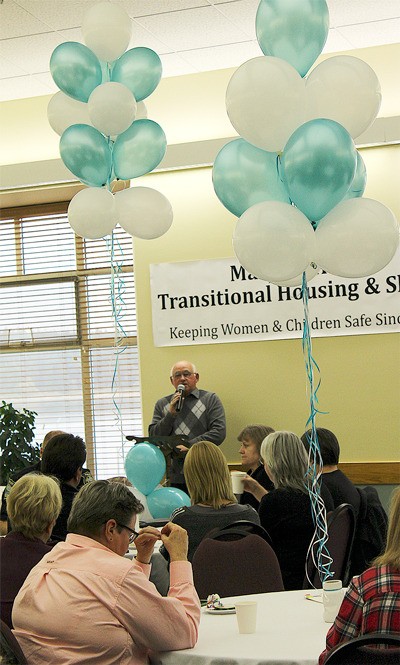Throughout the past decade, Marjie’s House has provided sanctuary for hundreds of women and children in crisis, many of whom cross the House’s threshold fleeing a life fraught with turmoil, pain and fear.
The House, which consists of an emergency shelter and a transitional housing unit, provides women and children seeking refuge with a safe space to stay as well as resources including case management and life skills education.
On Thursday, dozens gathered at the Oak Harbor First United Methodist Church to celebrate Marjie’s House’s tenth anniversary and to commemorate its success in aiding those in need.
“It’s really gratifying to know how many people support Marjie’s House,” said Cynde Robinson, executive director at Citizens Against Domestic and Sexual Abuse (CADA). “I know there are people in this room that have actually lived in Marjie’s House that have come today. To know that we have something that is so needed in the community…is really gratifying. That being said, we wish that we wouldn’t have to be here.”
Marjie’s House is a collaborative effort between CADA, the Opportunity Council of Island County and the Island County Housing Authority.
The transitional housing unit contains eight low-cost apartments in which families can live for up to 24 months. Within the past 10 years, 130 children, 108 women and 108 families have stayed in the transitional housing units. In the transitional housing program, residents receive assistance in financial literacy, life skills and case management. Rent is based on a sliding scale determined by income.
The House’s emergency shelter contains six apartments that provide women and children with a free, safe place to stay for up to 90 days. Three units are operated by the Opportunity Council and three are operated by CADA. The emergency shelter has housed 363 families, 357 children and 364 women.
Before the establishment of Marjie’s House, CADA had a property on Pioneer Way that housed three families in communal living quarters.
For families already facing conflict, sharing such close quarters was not the most desirable setup, according to Steve Gulliford, former executive director of the Island County Housing Authority and one of the founding members of Marjie’s House.
Baby blue balloons sprouted up throughout the room during Thursday’s event, each one symbolizing a woman who had taken refuge at the House.
On the table lay a photograph of namesake Marjie Monnett’s gravestone, her epitaph a permanent reminder of the seeds of confidence and hope she had sown throughout her life. “Remember the things that are good — the memories that help you smile and cope with life,” it read.
Monnett was a family self-sufficiency coordinator for the Housing Authority of Island County. She had seven children of her own, whom she had reared as a single mother. She met with an untimely death when she and her daughter, Holly, were shot and killed by Holly’s boyfriend in June 2002.
Gulliford recalled that discussions to create such a shelter began shortly after Monnett’s death in 2002.
In part, he said, it was an effort to build something positive from the tragedy.
A single mother named Alofa who had taken refuge with her daughter in both Marjie’s House emergency shelter and transitional housing unit related her story to the room of attendees.
She and her child had come to Whidbey from California and, homeless, sought assistance from the Opportunity Council. Living in perpetual transition was “a hard way to live” she recalled.
“When I found Marjie’s House, it was a huge change for me and my baby,” she said.
“I learned to have patience with myself. I learned to have faith in me as a woman,” she said. “And I became a strong mother to teach my daughter to be a strong woman when she grows up.”



